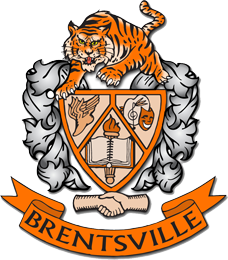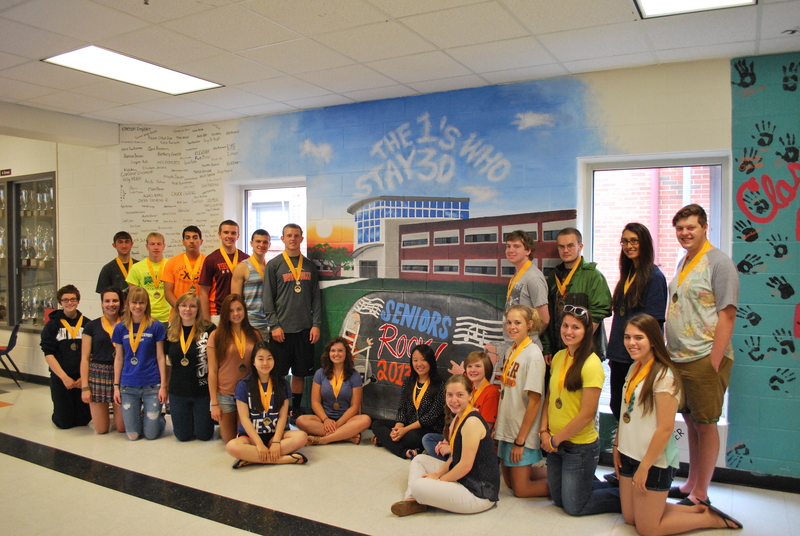By
the
end
of
twelfth
grade,
the
student
receiving
direct
gifted
education
resource
services
will:
- use metacognition to critically examine and communicate the complexity and abstract nature of knowledge and the variable ways of acquisition there of;
- assume leadership and participatory roles in both gifted and heterogeneous group learning situations;
- and synthesize understanding and abstract ideas from multiple disciplines by developing and delivering a variety of authentic products and by being metacognitive, cooperative, and confident participants in seminars.
By
the
end
of
eleventh
grade,
the
student
receiving
direct
gifted
resource
services
will:
- critically examine their own ability to examine and communicate the complexity and abstract nature of knowledge: the methods of acquisition, definition, and organization of a variety of fields of knowledge;
- assume primary responsibility for learning, and began to assume responsibility for self;
- and demonstrate application and analysis of abstract ideas in the discipline of language and social sciences through the examination of American identity and culture. The student will demonstrate the application and analysis by developing and delivering a variety of products and by being cooperative and confident participation in seminar.
By
the
end
of
tenth
grade,
the
student
receiving
direct
gifted
resource
services
will:
- critically examine the complexity knowledge and demonstrate an ability to differentiate between concrete and abstract knowledge: the methods of acquisition, definition, and organization of a variety of fields of knowledge;
- understand how to support an argument and listen to students with divergent views during seminar;
- and demonstrate application and analysis of abstract ideas primarily in the discipline of mathematics and science through the examination of scientific reasoning, paradigms, and metaphysics. The student will demonstrate the application and analysis by developing and delivering a variety of authentic products and by being cooperative and skilled seminar participants.
By
the
end
of
ninth
grade,
the
student
receiving
direct
gifted
resource
services
will
- critically examine the complexity of knowledge through cooperative seminar interactions: focusing on the methods of acquisition of knowledge in a variety of fields;
- understand that divergent views exist, and utilize both listening and speaking skills in seminar;
- and demonstrate application and understanding of ideas about human identity from multiple disciplines by developing and delivering a variety of authentic products and by being cooperative participants in seminar.
Frequently
Asked
Questions
1) What is gifted education?
It
is
important
to
first
define
how
a
gifted
student
is
identified.
A
student
identified
as
"gifted"
is
usually
one
who
thinks
in
a
broader
and
deeper
way
than
most
students.
They
see
beyond
the
subject
compartments
and
look
for
the
inter-dependency
of
disciplines.
Imagine
a
camera:
the
gifted
student
sees
life
through
a
"wide
angle"
lens
and
uses
many
filters;
whereas
it
is
more
usual
to
work
with
a
"normal"
lens.
The
US
department
of
Education
released
a
report
"National
excellence:
A
case
for
developing
America's
talent"
highlighting
the
conflicts
in
our
culture's
perception
of
giftedness.
Today,
exceptional
talent
is
viewed
as
both
a
valuable
human
resource
and
a
troublesome
expression
of
eccentricity.
As
a
culture
we
admire
and
reward
the
brilliant,
creative
mind
after
it
has
invented
something
practical
or
produced
tangible
results.
…The
nation's
high-
ability
students
receive
mixed
messages
urged
to
do
well
in
school
but
encouraged
not
to
flaunt
their
intelligence.
…Negative
stereotypes
of
high
achieving
students
have
created
an
atmosphere
in
which
students
do
not
want
to
be
identified
as
very
smart.
U. S. department of Education (1993)
U. S. department of Education (1993)
At
the
high
school
level
identified
students,
with
parental
permission,
are
pulled
out
of
their
classes.
Usually
this
is
done
one
hour
per
week
or
in
Brentsville's
case
one
hour
every
other
week
to
meet
in
seminar
with
their
age
group
peers.
The
majority
of
the
programs
include
an
assortment
of
critical
thinking
skills,
creative
exercises,
and
subjects
typically
not
introduced
in
standard
curricula.
Much
of
the
material
introduced
in"gifted
pull-out
programs"
deals
with
the
study
of
logic,
and
its
application
to
fields
ranging
from
philosophy
to
mathematics.
Students
are
encouraged
to
apply
these
empirical
reasoning
skills
to
every
aspect
of
their
education
both
in
and
outside
of
class.
2)
How
do
you
work
and
communicate
with
the
different
grade
levels,
how
do
you
plan
meetings,
and
what
paperwork
is
required?
There
is
a
curriculum
of
topics
to
be
addressed
laid
out
by
Virginia
Department
of
Education
for
each
grade
level:
The
overall
theme
at
the
high
school
level
is
"Order
out
of
Chaos"
The
9th
grade
asks:
Is
there
order
in
knowledge-
how
do
we
learn?
The
10th
grade
asks:
Is
there
order
in
the
universe?
The
11th
grade
asks:
Who
am
I
as
an
American?
What
makes
America,
American?
The
12th
grade
asks:
Who
am
I?
What
makes
me
the
unique
individual
that
I
am?
Work
with
high
school
students
is
always
done
using
a
Socratic
seminar
approach;
topics
are
introduced
usually
by
posing
a
series
of
essential
questions
followed
by
discussion
and
concluded
by
creating
an
authentic
product
(which
may
be
a
reflection,
drawing,
construction,
poem,
etc.).
Permission
for
services
has
to
be
obtained
from
parents
at
the
beginning
of
ninth
grade
or
when
a
student
enters
the
program
in
high
school.
Parents
are
informed
of
what
topics
are
to
be
covered
at
each
grade
level
in
the
form
of
a
"Differentiated
Service
Plan."
(A
copy
is
also
given
to
each
department
chair.)
This
plan
has
to
be
mailed
to
parents
by
October
1st
with
a
calendar
of
meetings
and
a
comprehensive
list
of
goals
for
each
grade
level.
I
also
continue
to
provide
seminar
and
topic
calendars
throughout
the
year.
At
the
end
of
the
school
year,
before
July
1
each
parent
receives
a
"Progress
Report"
this
details
how
their
child
has
received
services
throughout
the
year.
Examples
of
services
are:
seminar
attendance,
field
trips
and
conference
participation;
all
are
documented
and
filed
in
their
gifted
education
folder.
Special
projects
to
extend
or
enhance
the
curricula
of
advanced
class-work
and
active
participation
are
recorded
and
assessed
by
their
classroom
teachers.
The
Gifted
Education
Resource
teacher
meets
with
the
classroom
teachers
in
order
to
prepare
subject
matter
to
give
a
different
dimension
relevant
to
coursework
and
documents
when
this
occurs.
3)
Are
the
goals
of
this
program
tied
into
the
AICE
Thinking
Skills
classes,
and
if
so,
how
so?
According
to
the
curriculum
guide
lines
from
Cambridge
University;
"Thinking
Skills
develops
a
specific
set
of
intellectual
skills,independent
of
subject
content.
It
reflects
the
need
voiced
by
universities
and
employers
for
more
mature
and
sophisticated
ways
of
thinking.
The
Thinking
Skills
syllabus
also
enables
students
to
approach
their
other
subjects
with
an
improved
ability
to
understand,
analyze
and
resolve
problems.
As
a
result,
students
find
the
course
of
great
benefit
when
preparing
for
higher
education
and
for
a
wide
range
of
careers,
including
law,
scientific
research,
social
science,
journalism,
medicine,
business,
accounting
and
engineering.
As
a
curriculum
subject,
Thinking
Skills
offers
students
an
excellent
opportunity
to
express
themselves
freely
and
openly.
The
Thinking
Skills
syllabus
encourages
free
and
open
debate,
critical
and
investigative
thinking,
and
informed
and
disciplined
reasoning"
The
aims
of
the
Thinking
Skills
syllabus
are:
•
To
give
candidates
a
specific
and
transferable
set
of
skills
for
solving
problems,
critical
thinking
and
reasoning.
•
To
encourage
candidates
to
apply
these
skills
to
realistic
scenarios.
•
To
develop
candidates'
abilities
to
understand
and
engage
confidently
in
argument
and
reasoning.
It
can
be
noted
that
the
goals
of
Thinking
Skills
and
Gifted
Education
are
parallel;
other
schools
have
"GEMS"
or
"Theory
of
Knowledge"
depending
on
the
schools'
specialization.
Therefore
it
is
reasonable
to
intertwine
the
topics
to
be
discussed
with
the
thinking
skills
topics
as
the
majority
of
the
students
in
this
course
are
identified
gifted
education
students;
unfortunately
not
all
gifted
education
students
are
able
to
take
this
course
because
they
have
a
very
demanding
academic
load
and
the
class
cannot
be
offered
every
block;
so
these
students
meet
in
their
seminar
lunch
groups
and
the
same
topics
are
explored
but
in
a
less
in-depth
way.
4)
Are
there
any
other
important
points
about
the
program
that
you
feel
are
misunderstood?
Identification:
Usually
students
are
identified
in
elementary
or
middle
school;
but
any
in-coming
student
(with
their
parents'
permission)
is
initially
screened.
Any
student
at
any
grade
level
may
be
screened;
if
they
their
parents,
teachers,
or
any
other
adult
recommends
the
student
for
gifted,
then
the
student
may
be
screened.
If
they
fall
in
the
normal
to
high
range,
using
PSAT,
SOL
scores,
or
any
other
external
examination
scores,
they
are
invited
for
further
testing.
Further
testing
includes
the
COGAT,
which
I
administer..Teachers
of
the
student
are
asked
to
give
a
recommendation
and
samples
of
work
are
produced.
This
application
is
then
sent
to
a
panel
of
gifted
education
resource
teachers
who
scrutinize
the
submissions
and
make
a
decision
as
to
whether
or
not
the
student
meets
the
criteria.
This
maybe
in
one
or
many
disciplines.
If
a
student
is
recommended
to
receive
gifted
services
they
are
included
in
that
school's
group.
It
must
be
understood
this
is
not
a
club
that
one
can
join
or
not
join.
Gifted
programs
are
designed
around
a
way
of
learning
that
will
remain
with
the
student
as
the
student
matures-
a
gifted
student
becomes
a
gifted
adult
with
all
the
rewards
and
consequences
it
encompasses.
First
and
foremost
a
gifted
student
is
a
teenager
with
hopes
and
dreams,
just
like
any
other,
they
make
mistakes
and
are
hard
on
themselves.
They
may
make
bad
choices
and
they
may
not
always
get
good
grades.
They
have
emotional
ups
and
downs,
want
to
"fit
in",
actually
enjoy
sports,
video
games,
and
talking
on
the
phone.
Educators
understand
the
scheduling
concerns
for
gifted
students.
For
example,
students
have
the
choice
in
PWC
to
enroll
in
Gems
or
AICE
Thinking
Skills;
however,
this
means
choosing
this
class
over
another
class
or
elective.
If
the
student
must
be
serviced
by
the
pull-out
program,
gifted
education
teachers
work
hard
scheduling
this
as
we
know
students
often
do
not
want
to
leave
their
scheduled
class-whether
it
is
an
honors
class,
one
in
which
they
struggle,
or
one
which
they
simply
enjoy.
In
either
scenario,
students
are
faced
with
a
choice,
and
we
understand
it
is
not
necessarily
and
easy
one
to
make.
To
that
end
we
do
our
best
to
find
creative
ways
to
provide
services,
whether
it
be
working
with
core
teachers,
using
enrichment
activities
for
projects
or
field
trips,
or
having
part
of
a
Socratic
seminar
over
lunch.

